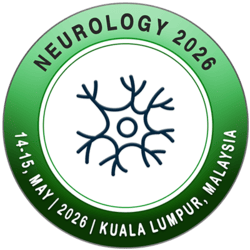Track: Geriatric Neurological Disorders

Session Overview:
Recent Development:
The "Geriatric Neurological Disorders" session at the Neurology 2025 will offer a comprehensive exploration of neurological conditions impacting the elderly. Attendees will gain deep insights into the latest advancements in this field, including cutting-edge research on cognitive decline, such as Alzheimer's disease, and the development of novel diagnostic tools and treatment options. The session will address recent progress in managing stroke and vascular disorders, with a focus on innovative prevention strategies. We will also cover advancements in the treatment of movement disorders like Parkinson's disease and essential tremor, and the integration of neuropsychiatric care for conditions such as depression and anxiety. Emphasis will be placed on neurorehabilitation techniques and supportive care to enhance patient outcomes. This session aims to equip participants with up-to-date knowledge and practical strategies for improving care for elderly patients with neurological disorders.
Recent Development:
Recent strides in geriatric neurological disorders have revolutionized the field. Advances in Alzheimer's research have introduced new biomarkers and imaging technologies, enabling earlier and more accurate diagnoses. Innovative pharmacotherapies targeting neuroinflammation and protein aggregation offer promising avenues for managing cognitive decline. Stroke care has seen significant progress with enhanced endovascular interventions and remote monitoring, improving timely treatment and recovery. Breakthroughs in movement disorders, such as advanced deep brain stimulation and emerging gene therapies, provide new options for symptom management. Additionally, a holistic approach to neuropsychiatric care is addressing the intricate relationship between neurological and psychiatric symptoms. These developments are further supported by advancements in neurorehabilitation techniques and supportive care strategies, all aimed at enhancing the functional recovery and overall quality of life for elderly patients.
Sub-Tracks:
Cognitive Decline and Dementia
Explore the mechanisms, diagnosis, and management strategies for various forms of dementia, including Alzheimer's disease, and their impact on cognitive function in the elderly.
Stroke and Vascular Neurology
Examine the latest advancements in the prevention, diagnosis, and treatment of stroke and other vascular-related neurological conditions affecting older adults.
Movement Disorders
Discuss recent developments in understanding and managing movement disorders such as Parkinson's disease and essential tremor, focusing on therapeutic approaches and patient care.
Neuropsychiatric Disorders
Analyze the intersection of neurological and psychiatric conditions in the elderly, including depression, anxiety, and psychosis, and their implications for treatment and management.
Neurorehabilitation and Supportive Care
Review innovations in neurorehabilitation techniques and supportive care strategies designed to improve quality of life and functional outcomes for elderly patients with neurological disorders.
Neurodegenerative DiseasesIncludes conditions like Alzheimer's disease, Parkinson's disease, and amyotrophic lateral sclerosis (ALS), focusing on their progression, pathology, and treatment options.
Functional Impairments in Aging
Examines how neurological disorders impact daily functioning and quality of life in the elderly, including difficulties with mobility, communication, and self-care.
Geriatric Neuroimaging
Focuses on advances in imaging techniques and their role in diagnosing and monitoring neurological disorders in older adults.
Pharmacological Management of Neurological Disorders
Addresses the challenges and strategies in prescribing and managing medications for elderly patients with neurological conditions, considering polypharmacy and drug interactions.
Palliative and End-of-Life Care in Neurology
Covers approaches to providing comfort and managing symptoms for elderly patients with advanced neurological diseases, including ethical considerations and family support.
Scientific Highlights
- Neurology
- Neuro Anatomy
- Mental Health and Psychiatry
- Geriatric Neurological Disorders
- Neuromuscular Diseases
- Brain Tumor and Neuro-oncology
- Cerebrovascular and Critical Care Neurology
- Clinical Neurophysiology
- Central Nervous System
- Neuro-Ophthalmology
- Pediatric Neurology
- Neuroimaging and Brain Mapping
- Neurogenetics and Neurodegenerative Disease
- Behavioral and Cognitive Neuroscience
- Neurochemistry and Neuropharmacology
- Spinal Neurosurgery and Neural Transplantation
- Neuro Robotics and Neuro Modulators
- Addiction and Adult Psychology
- Brain Stimulation and Computational Neuroscience
- Neural Control of Micturition
- Parkinson's Disease


